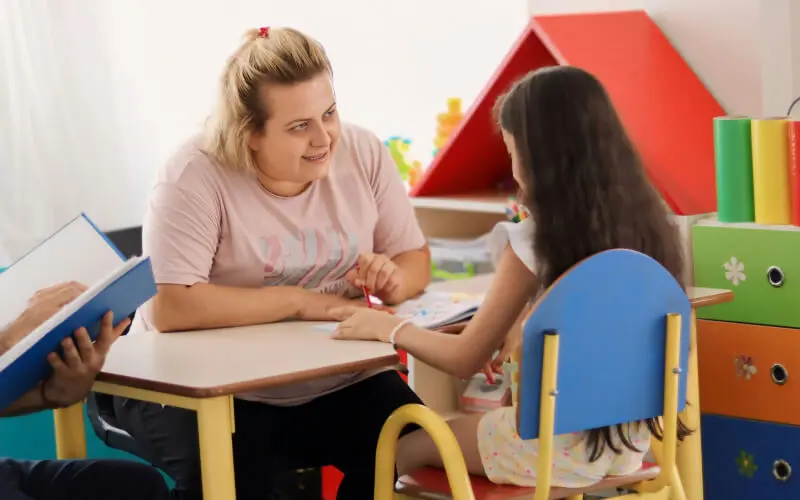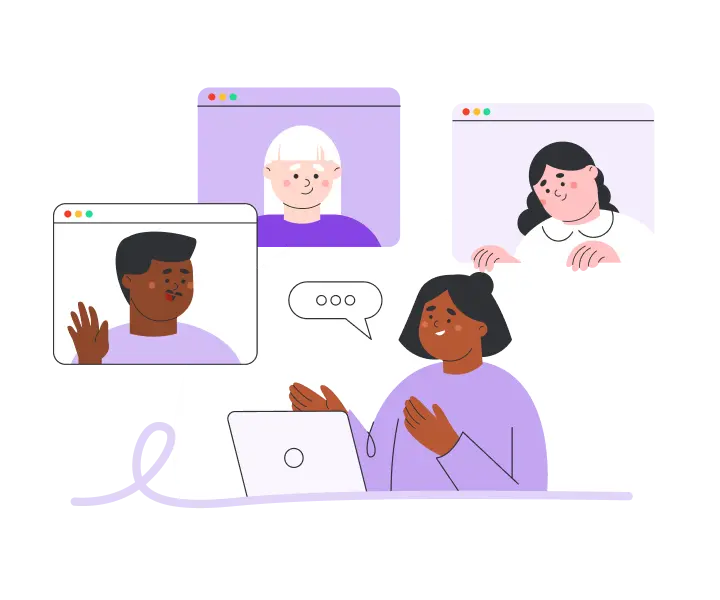settings
children
With Famly since
If you’ve ever spent time with young children, you know how quickly they can pick up our habits, mannerisms, phrases and words.
Say something once—just once—and it’s suddenly part of their daily vocabulary. You mutter “sh*t” after stubbing your toe, and now your 4-year-old is running around saying it over and over again.
Or you casually call your partner “honey,” and two hours later, your child is sweetly asking, “Honey, can I have more Goldfish?” Cute? Yes. Confusing for a stranger walking by? Also yes.
The point is, kids are always listening. But it’s not just kids—we all absorb meaning from words, whether we realize it or not. And while it’s sometimes harmless (or just mildly embarrassing), other times they shape how we see the world. Words can be funny. But they can also be powerful—and yes, sometimes harmful.
It’s funny when it’s a swear word or a “pet name.” But it’s also a good reminder - words stick. And not just with kids.
The way we talk about things shapes how we think about them. That’s why, in the early childhood education sector, there’s a growing push to pay closer attention to the language we use. Enter the Words Matter movement—a call to rethink everyday terms like “daycare” that might seem harmless, but actually have deeper (hurtful) implications than we might think.

What is the Words Matter movement in ECE?
The Association for Early Learning Leaders (AELL) recently came out with a statement called Words Matter, a broader advocacy and awareness effort within the early childhood education community about using intentional language.The words we use - specifically, daycare - shape public perception, influence policy, and can either uplift or diminish the profession.
Let’s back up a bit though.
How did the Word Matters movement begin?
Research shows how pivotal high quality care is
At Famly, we believe that early childhood are the most important years. It’s when brains are built, not just filled. In these formative years, children are incredibly malleable - absorbing language, developing empathy, learning to regulate emotions, and building the foundation for how they see the world and themselves.
And guess what? Science proves how influential these early years are. Our “brains develop faster during ages 0-3 than at any other time in life,” with 90% of our brain rapidly developing before age 5.
Science also proves the long lasting effects of high quality childhood education, not only cognitively and socially, but also physically.
In fact, this study is the beginning of the Words Matter movement.
How research is shared influences social norms
The New York Times shared this study’s findings, but when referencing it, they used the term “full-time day care" to describe the programs. Then, Katherine Rose, an Associate Professor in Early Child Development and Education at Texas Woman’s University, wrote a piece in the Huffington Post about how harmful it is that such a prestigious organization - The New York Times - would normalize phrases like daycare.
The big ideas
Why is daycare a bad word?
So what’s all the fuss about? Why is daycare such an infuriating word to ECE staff and educators? The term “daycare” tends to:
- Undermines the profession: Daycare implies that what’s happening is just “care during the day” while parents are at work. It doesn’t acknowledge the intentional, developmental, and educational work.
- Erases the educator’s role: Daycare frames early childhood teachers more like babysitters than professionals who have spent years strengthening their skills in pedagogy, the intricacies of child development, and social-emotional learning.
- Minimizes what children actually need: Young children aren’t just being “watched.” They’re learning and growing into holistic, caring, considerate, unique individuals, and being supported, encouraged and appropriately challenged by people trained to scaffold their development.
- Belittles the impact of early childhood education: As the research above states, high quality early childhood education is what contributes to long lasting health - cognitively and physically. Without that deliberate education, we would be doing a disservice to the children in the short- and the long-term.
As Katherine Rose explains in her article (mentioned above),
“For many of us, day care, unlike the term preschool, conjures up visions of children warehoused all day in an uninviting, unstimulating environment…The term "day care" emphasizes the fact that the child is away from home all day as opposed to the fact that what's happening (if it's going as it should) is that the child is being molded for life -- and if he or she spends 40 hours a week in a child care program, it can be as important or arguably more important than time at home.”

Daycare doesn’t encompass all that high quality care does
I’ve talked about the importance and benefits of “high-quality childcare,” and how daycare doesn’t meet those standards. So let’s clarify - what is high-quality care?
The word “daycare” falls short in describing the depth and complexity of what quality early childhood care really looks like. It’s not just about just keeping children safe while parents and caregivers are at work. It’s about nurturing every aspect of a child’s development.
High-quality care includes a thoughtful, research-backed curriculum designed to spark curiosity, support social-emotional growth, and build foundational skills through play and various types of learning. It means a diverse range of activities, like creative art, outdoor exploration, STEM, guided play or child-led play.
Plus, it’s not a one-size-fits-all. High-quality care is individualized and tailored to support unique needs and interests, which also reflects the expertise of educators who are trained in child development, creating welcoming environments, and knowing the appropriate way to challenge and encourage them to learn or try something new.
And perhaps most importantly, high-quality care encourages strong partnerships with families, recognizing that a child’s development doesn’t stop at the classroom door, but should complement the learning and growing happening at home.
In short, high-quality childcare is education, care, community, and advocacy—all rolled into one - and daycare hardly touches on any of that.

The larger impact of words
The words we use don’t just describe early education—they define how it’s valued. When we call it “daycare,” we risk minimizing the expertise, dedication, and deep impact of early educators. But when we say “early childhood education,” we’re naming it for what it truly is: essential, skilled, and foundational work.
That shift in language doesn’t just change minds—it can change policies because the words we use become intertwined with what society defines as “normal.” How we talk about early childhood education can influence how governments prioritize funding, how parents view their child’s care, and how educators are treated, paid, and supported.
In short, words shape the narrative. Choosing the right words helps shift that narrative, building momentum for better funding, support, and respect for the profession - just like they’ve always deserved.
Why now?
AELL’s statement, Words Matter, begins with the powerful statement: “This conversation is not new. This conversation is not always easy. This conversation is, however, necessary.”
Early childhood educators are consistently underappreciated, and Words Matter is just putting an official title to an ongoing issue. It’s just another effort to put their foot down, clearly, and powerfully.
The hope? This movement is a simple change with a much larger impact. By eliminating one word from our vocabulary (daycare), we are showing greater appreciation for the truly miraculous work early childhood educators do each and every day.
Top tips from Reynolda Preschool
Get top tips from a preschool just like yours. Hear from Reynolda Preschool on why and how they use Famly - and why they’ve never looked back.
Read their story




.webp)




